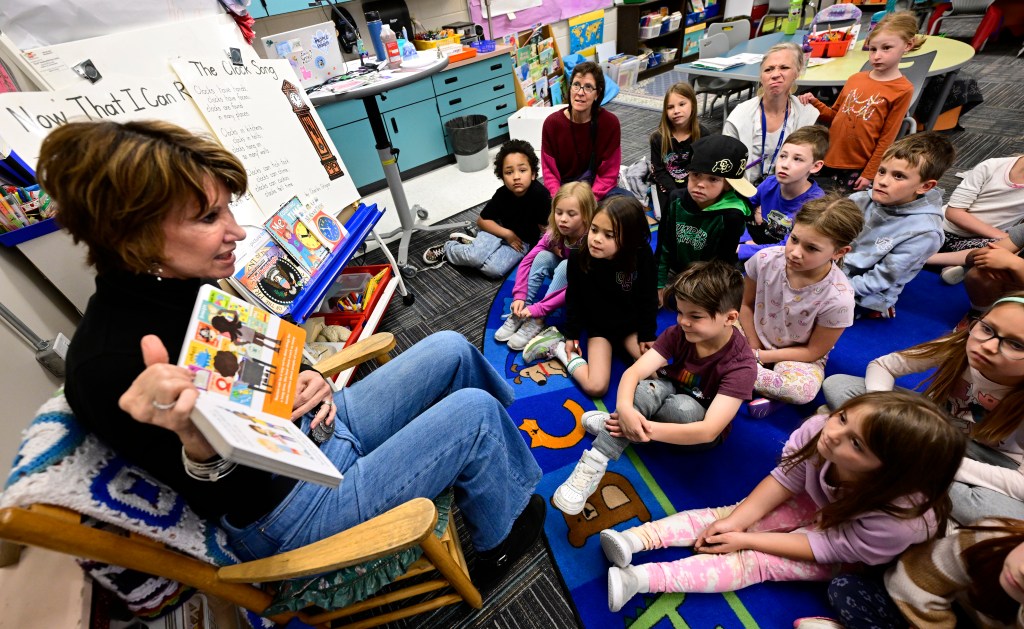Colorado
YWCA celebrates 10 years of overseeing Reading to End Racism


Shiquita Yarbrough read a book this week to Fireside Elementary third graders that followed a Black third-grader as she rode her bike around the thriving Greenwood community before it was destroyed in the 1920 in the Tulsa Race Massacre.
After finishing “Opal’s Greenwood Oasis,” Yarbrough told the class at the Louisville school that Black people at the time “weren’t even considered people” and were treated as inferior. She also talked about the importance of being allies.
“You have the opportunity to make our future better,” she said. “What can we do differently knowing we have the power to change the world, knowing racism is wrong?”
Yarbrough, the YWCA Boulder County’s community engagement and equity director and a Longmont City Council member, manages the Reading to End Racism program. Reading to End Racism is celebrating its 10th year as part of the YWCA Boulder County.
The YWCA began overseeing the longstanding program, which sends volunteer readers to area classrooms, in 2013. The program originally started in the 1990s as a community partnership with the Boulder Valley School District. The goal is for volunteers to use books and personal stories to talk about discrimination.
“The core idea is the same,” Yarbrough said. “It’s definitely even more important now with the divisiveness in our country to have these conversations.”
While the program has stayed true to its original model, the YWCA provided more support and infrastructure. One change Yarbrough made was creating a more in-depth training for volunteers.
The training, which takes about four hours, includes a discussion of the volunteers’ biases, an overview of book lesson plans and ideas on how to answer tricky student questions. They’re also taught not to single out students of color.
“We have to be aware of our own biases and issues so we don’t bring those into a classroom,” Yarbrough said.
The program also offers an optional information session for parents, while students receive an information sheet to take home that includes a book summary and discussion questions.
“We want to make sure parents can continue the conversations,” Yarbrough said. “We don’t want it to just be us going into the schools once a year. We’re just planting the seed of kindness. Someone else will come and water that seed.”
The program this year has about 20 active volunteers, including several longtime volunteers.
Tedd Davis, a retired Microsoft director and Longmont Community Foundation board member, started helping with the program in 2008. He grew up in California’s Orange County, where he was the first Black person many of his classmates had ever met. While he wasn’t welcomed at school, his family wasn’t welcomed in their all-white neighborhood.
“I can share my experiences to try to help the world be a better place,” he said.
At Fireside on Thursday, he provided fifth graders with a packet of information that included facts, graphics and definitions as a starting point to talk about stereotypes, prejudice and racism. Racism, he said, is an attack on a person’s identity.
“We’re all folks,” he said. “We all have something to contribute. People from different cultures with different perspectives make you better, if you are open to listening to them.”
He shared the dangers of “lazy thinking,” giving examples that included assuming that everyone with brown skin is Mexican, that all Muslims are terrorists and that homeless people are lazy.
“You don’t have to like everybody, but you have to give everybody a chance to be themselves,” he said.
Fireside English language development teacher Shelby Warshaw, who invited Reading to End Racism to the school, sat in on the session led by Yarbrough. She encouraged the students, most of whom were white, to act as allies.
“If you see someone being treated unfairly, you need to stand up for them,” she said. “If you see that happening, you need to be strong and use your voice.”













You must be logged in to post a comment Login